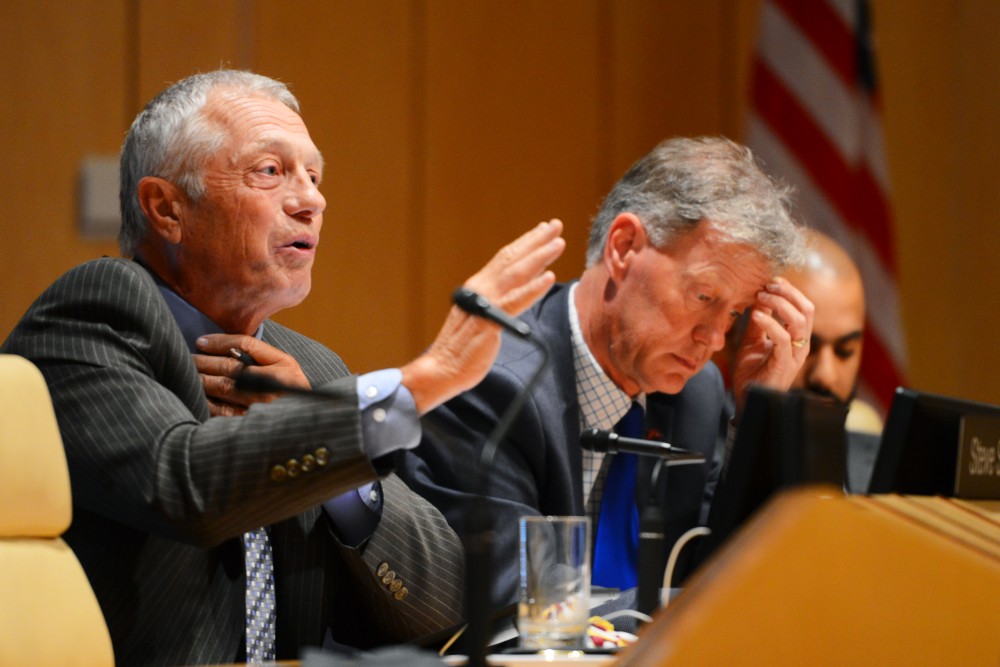The University of Minnesota’s Board of Regents passed the fiscal year 2019 budget, discussed ways to increase enrollment and reviewed a drafted plan for a system-wide task force at their June meeting. The board also held a non-public meeting to conduct an annual performance review of University President Eric Kaler.
President’s budget proposal
The Board approved Kaler’s proposed annual operating budget for fiscal year 2019, which passed with an eight to four vote despite opposition from several regents regarding tuition increases.
The budget raises tuition for in-state undergraduate students by two percent at the Twin Cities campus and one percent at the Morris campus.
The board approved a 15 percent increase for nonresident incoming undergraduates at the Twin Cities campus in December 2017.
Several regents expressed dissent for the budget over the tuition increase.
Regent Randy Simonson proposed that resident tuition be decreased by one percent across all campuses, and Vice Chair of the Board Kendall Powell suggested increasing resident tuition on the Twin Cities campus by only one percent.
Neither amendment gained enough votes to pass.
“I just don’t think that two percent is a sustainable rate increase. I worry that if we do two percent now, we will come back next year and say, ‘we did it a year ago,’ and three or four years down the track this place is going to be $800 to $900 more expensive. I think that’s a bad place for us to be,” Powell said.
The approved budget also includes an amendment calling for a more extensive review process for hiring positions supported by operations and maintenance funds and a funding request for the law school.
Beginning July 1, hiring for University positions entirely paid for by operations and maintenance funds, which are made up of state appropriations and tuition, must be approved by Provost Karen Hanson and Senior Vice President for Finance and Operations Brian Burnett.
Board of Regents chair David McMillan proposed an amendment in the budget to alter funding for the law school.The law school requested additional funding in May to maintain their national ranking.
McMillian proposed that the board should only approve the first year of the law school’s requested $1.7 million and later re-evaluate if additional funding is necessary.
“We can’t continue this much longer, it’s extremely expensive for the University,” McMillan said at the meeting.
Plans to bolster enrollment
The board discussed a plan drafted by the Systemwide Enrollment Planning Taskforce, which aims to create strategies to increase enrollment by 2024. The task force identified several goals such as increasing enrollment by 3,000 students across all campuses and offsetting the migration of Minnesota students who leave the state to attend competitor universities.
According to data presented to the board, more freshmen left Minnesota to go to public universities in the upper Midwest than came into the state in fall 2016.
The task force identified several potential strategies for achieving these goals, such as improving the brand of the University, building more awareness about the smaller University system campuses and offering applicants admission to other campuses if they are not accepted to their preferred school.
Regent Dean Johnson said the University should work to make sure recruitment and admissions staff are properly trained to give all prospective students a welcoming campus visit, and suggested that staff call prospective students to find out how the University can cater to their academic and personal needs.
System-wide strategic plan
As part of a system-wide strategic plan to improve the University campuses, the board discussed teaching and learning as potential areas of focus. This was the board’s fourth presentation about potential focus areas for the plan.
Provost Karen Hanson identified several recommended strategies including expanding scholarship programs, growing more partnerships with Minnesota high schools and articulating the differences in campus climate between the five University campuses.
Regent Steven Sviggum questioned the proposed financial aid strategy in the presentation that expanded select scholarship programs.
“The money we get from the Legislature should be for University programs and University missions for all students, not concentrating benefits to some at the expense of others,” Sviggum said.








